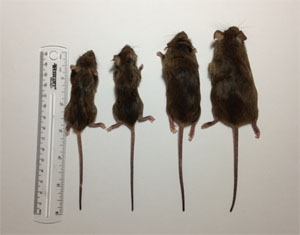
University of Iowa Carver College of Medicine
Department of Internal Medicine
3180 Med Labs
Iowa City, IA

Area of research focusing on the degradation of misfolded glycoproteins by the ubiquitin proteasome pathway and autophagy.
Aging
Regulated protein degradation is critical for many cellular processes such as aging, cell cycle progression, signal transduction, and transcription. Proteins are targeted for degradation as a result of protein unfolding, protein misfolding during translation, or after specific posttranslational modifications, such as phosphorylation. Even under normal conditions, up to 30% of all cell membrane and secreted proteins made in the endoplasmic reticulum fail to fold properly, and must be immediately degraded. Aggregation of these misfolded proteins is common in many age-related neurodegenerative diseases. But little is known about what happens to misfolded proteins in normal aging. A prevalent hypothesis in aging research suggests that misfolded proteins accumulate during senescence. However, because of the difficulties in measuring the levels of misfolded proteins directly, there is no primary evidence to support this hypothesis. Recently we have developed the tools necessary to measure levels of misfolded glycoproteins. We are now beginning to address the question, “Are misfolded glycoproteins the cause or a consequence of aging?”
Multiple sclerosis
Multiple sclerosis (MS) is a devastating disease with no known cure. Recently researchers at the University of Iowa were funded to try a radical diet based approach to treat one form of MS called secondary progressive multiple sclerosis (SPMS). In the case of SPMS most recent data is supports environmental factors rather than genetics as the predominate cause. The relationship between SPMS and developed countries also suggest that diet may be a major factor in its development or progression of disease. The completed study involved SPMS patients undergoing treatment with a ‘Paleolithic diet’ with vitamin supplementation. We have found a significant change in both total glycoproteins and misfolded glycoproteins in the serum of patients completeing this diet. We are currently identifying and studying these potential biomarkers.
Alpha-1 Antitrypsin deficiency
In the disease, alpha-1 antitrypsin deficiency, misfolded, mutant alpha-1 antitrypsin accumulates in the endoplasmic reticulum (ER) of hepatocytes, impairing ER function and resulting in liver toxicity. In Caucasians,1% are heterozygous for the most common disease variant ,A1AT-Z. It is the most common cause pediatric hepatic failure requiring transplant, and in adults thirty percent of patients homozygous for A1AT-Z (PiZZ) suffer chronic liver disease . The key disease-initiating event is the failure of hepatocytes to degrade misfolded A1AT-Z. We are currently examining a novel ubiquitin ligase, FBG1, as an important mediator of A1AT-Z degradation via alternative autophagy.
Grants Received
Federal:
Analysis of Fbox2 Family of Ubiquitin Ligases [Award No: 1 R01 NS047535-01]
(Co-investigator: Dr. Kevin Glenn, PI: Dr. Hank Paulson, source: NIH)
1/1/04-12/31/07Novel Ubiquitin Ligases in Liver Protein Quality Control
(PI: Dr. Kevin Glenn, source: Veterans Affairs-Research Career Development)
11/01/06-10/31/09Hepatic Protein degradation in A1AT deficiency and senescence
(PI: Dr. Kevin Glenn, source: Veterans Affairs-Career Development Award)
03/1/11-3/1/13
State:
Novel Ubiquitin Ligases in Melanoma and Aging
(PI: Dr. Kevin Glenn, source: Cancer and Aging Program)
09/01/06- 08/31/07
Protein Quality Control in DYT1 Dystonia.
(PI: Dr. Kevin Glenn, Source: Carver Collaborative Pilot Grant)
06/01/08-06/01/10
Private:
Novel Ubiquitin Ligases in A1AT Degradation
(PI: Dr. Kevin Glenn, source: Alpha-1 Foundation)
07/01/06-06/30/08Do Misfolded Proteins Accumulate with Age or Senescence?
(PI: Dr. Kevin Glenn, source:Ellison Medical Foundation New Scholar in Aging)
07/01/08- 09/30/12